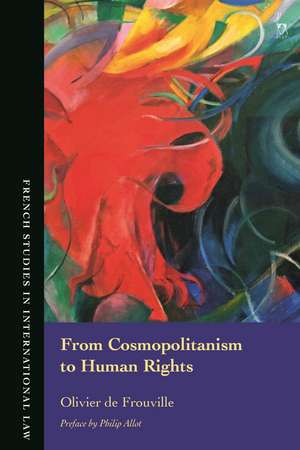From Cosmopolitanism to Human Rights: French Studies in International Law
Autor Olivier de Frouville Prefață de Philip Alloten Limba Engleză Paperback – 28 iun 2023
| Toate formatele și edițiile | Preț | Express |
|---|---|---|
| Paperback (1) | 319.68 lei 43-57 zile | |
| Bloomsbury Publishing – 28 iun 2023 | 319.68 lei 43-57 zile | |
| Hardback (1) | 570.43 lei 43-57 zile | |
| Bloomsbury Publishing – 12 ian 2022 | 570.43 lei 43-57 zile |
Preț: 319.68 lei
Preț vechi: 391.05 lei
-18% Nou
Puncte Express: 480
Preț estimativ în valută:
61.17€ • 64.04$ • 50.61£
61.17€ • 64.04$ • 50.61£
Carte tipărită la comandă
Livrare economică 07-21 aprilie
Preluare comenzi: 021 569.72.76
Specificații
ISBN-13: 9781509955510
ISBN-10: 1509955518
Pagini: 296
Dimensiuni: 156 x 234 x 25 mm
Greutate: 0.41 kg
Editura: Bloomsbury Publishing
Colecția Hart Publishing
Seria French Studies in International Law
Locul publicării:London, United Kingdom
ISBN-10: 1509955518
Pagini: 296
Dimensiuni: 156 x 234 x 25 mm
Greutate: 0.41 kg
Editura: Bloomsbury Publishing
Colecția Hart Publishing
Seria French Studies in International Law
Locul publicării:London, United Kingdom
Caracteristici
Confronts traditional ways of thinking about the international law order
Notă biografică
Olivier de Frouville is Professor of Public Law at the University Panthéon-Assas (Paris II), France.
Cuprins
Introduction PART IELEMENTS FOR A DEMOCRATIC THEORY OF INTERNATIONAL LAW1. What is Legal Cosmopolitanism? I. Cosmopolitan Sentiment and Phenomenology of the Relation to Others II. Relation to the Other and Society III. From Cosmopolitan Feeling to Legal Cosmopolitanism2. On the Theory of the International Constitution I. Georges Scelle's Concept of the International Constitution II. A Theory of the International Constitution Based on a Democratic Theory of International Law III. An Overview of the Evolution of the International Constitution IV. Conclusion 3. A Cosmopolitan Perspective on the Responsibility to Protect I. Analysis of the Pivotal Concepts of R2P II. Outline Reconstruction of a Cosmopolitan Theory of Humanitarian Intervention 4. Justifying International Law, Defending Cosmopolitanism I. Cosmopolitanism as the Flip Side of Neoliberalism II. Cosmopolitanism as the Construction of a Rootless Individualist III. The Theoretical and Practical Impossibility of World Politics IV. A Few Seemingly Inconsequential Thoughts by Way of an Inconclusive Conclusion.5. A Critical Defence of Human RightsI. The Critical 'Positivist' Approach II. The External Critical Approach Contesting 'Rights' III. The External Critical Approach Defending Human Rights 6. Natural Law, Human Rights, the Law of Nature: Towards a Revived Modernity I. The Discourse of Sovereignty and Voluntarism II. The Discourse of Human Rights III. The Discourse of Nature 7. Towards a Democratic Theory of International Law I. The Theoretical Structure of Classical International Law II. Cosmopolitan Projects: A Democratic Conception of International Law III. The Bases for a Democratic Theory of International Law PART IITOWARDS WORLD CITIZENSHIP: 'COSMOPOLITAN BUILDING SITES'8. Civil Society's Role in International Organisations. Theory(ies) and Practice(s) I. The Obvious Point II. An Unthought-of Point 9. Building a Universal System for the Protection of Human Rights: The Way Forward I. Change or Continuity: Has the Establishment of the Council Really Changed Anything in the Universal Systemof Human Rights Protection? II. Is the UPR a Real Added Value to the System? III. Why the Council does not Represent a Real Progress for the Universal Human Rights Protection System IV. Towards Progress: How Could the System for the Protection of Human Rights Evolve in the Future? 10. Why Do We Need a United Nations Court of Human Rights?I. The Origins of the Idea of a Universal Court of Human RightsII. The Present Context Justifying the New Impetus Behind the Idea: The Necessary Reform of theUniversal System of Protection of Human Rights III. Responses to Some Objections on Principle IV. Realisation of the Idea of a United Nations Court of Human Rights 11. The Committee System: 2020 and Beyond 12. The Universal Declaration of Human Rights is 70 Years Old: What Challenges Await the United Nations? I. A Legal Basis for Action II. An Intellectual Challenge III. An Institutional Challenge IV. The Normative Challenge 13. Reforming the Security Council: What can be Done Without Amending the UN Charter?I. The Concepts II. The Processes III. The Outcomes IV. Conclusion 14. The Right to Veto in the United Nations: Towards the Abolition of a Privilege Universal System of Protection of Human Rights






